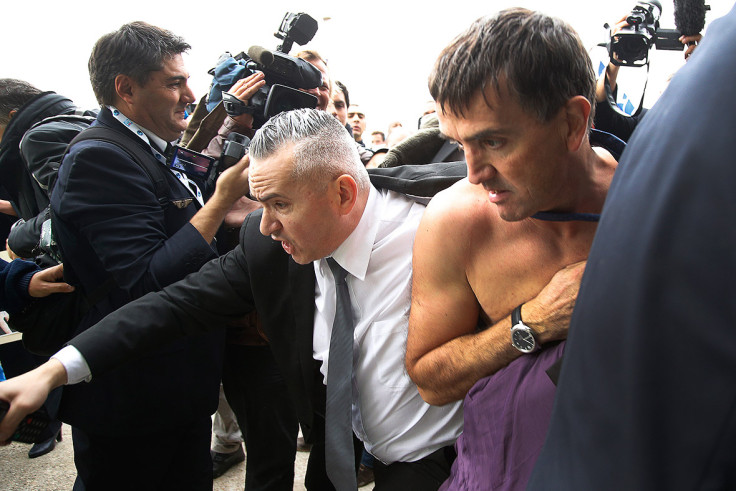Air France: Stripping, 'bossnapping' and barricades - French workers on the rampage

Following an announcement by Air France that it would implement its first forced dismissals since 1993 and cut 2,900 jobs, company executives were attacked and stripped half-naked by enraged employees.
The shocking levels of violence directed at French employers is practically unheard of to British ears but France has a strong tradition of mass mobilisation until demands are met and "bossnapping" and other tactics have turned out to be highly effective negotiating tools. IBTimes UK profiles past incidents in France where employees seized power rather than having a good old British moan.
1. We run the Eurostar and don't you forget it! (2015)
Thousands of cross-Channel travellers experienced huge travel upheaval as striking ferry workers in Calais shut the port and blocked Eurotunnel services, meaning both Eurostar and Shuttle services were suspended due to the tracks being set ablaze.
Cue chaos: three-hour delays at Folkestone for Shuttle services, Dover to Calais ferry crossings ground to a halt and lorries were forced to stack along the M20 as a result of the mayhem. The reason? Eurotunnel (which also owns the ships) sold the cross-channel service to rival operator DFDS, leaving 600 jobs at risk.
2. The wheels came off for Goodyear executives (2014)
Workers at a Goodyear tyre factory threatened with closure in Amiens, northern France, took two company executives hostage and refused to let them leave without a huge pay-off. Some 1,173 workers were set to lose their jobs in the cuts.
Production manager Michel Dheilly and human resources director Bernard Glesser were due to meet with union representatives, but up to 200 workers refused to let them leave, barricading the meeting room door with a tractor tyre. After being detained for 30 hours, the executives were released after the police intervened.
3. If they won't listen, we'll set fire to it (2014)
A group of farmers outraged at falling living standards and prices for their products torched tax and insurance offices in Morlaix, Brittany. Apart from the fire itself, the livid workers smashed windows and blocked a busy main road in both directions, stopping rescue workers from reaching the blaze.
The farmers would only accomplish their mission when tractors full of unsold artichokes and cauliflowers as well as manure were dumped outside the tax office for good measure. In the words of Morlaix mayor Agnès Le Brun: "Farmers are not madmen, they are company bosses who are not being listened to."
4. Caterpillar bosses captured (2009)
At the height of the economic downturn, construction manufacturing giant Caterpillar announced over 700 workers would be laid off; the workers snapped and they took their bosses hostage. Incredibly, it was the fourth incident of its kind within a month. A professor of comparative labour law at the University of Paris-Nanterre shed some light on the tactic, saying it was the employee's way of saying "it's our company too".
The executives, which included the chief executive of Caterpillar France, Nicolas Polutnik, experienced an uncomfortable night, including having their ear drums pummelled by revolutionary rock music and angry threats shouted by employees. In the end, talks with unions were resumed and Caterpillar agreed to a government mediator on how compensation for employees who were being laid off could be improved.
5. Abductions are all the rage (2009)
Kidnapping has turned out to be an effective bargaining chip for workers facing redundancy. In this particular case, desperate staff held Luc Rousselet hostage in his office for more than 24 hours in a bid to force redundancy negotiations.
Far from being subjected to rough treatment, the factory manager of US company 3M was treated to an upmarket meal of mussels and chips. He was subsequently released and the workers pursued their grievances in court. Lo and behold in July 2013, 3M was ordered to pay €800,000 (£590,000, $894,000) to 110 laid-off workers.
© Copyright IBTimes 2025. All rights reserved.






















